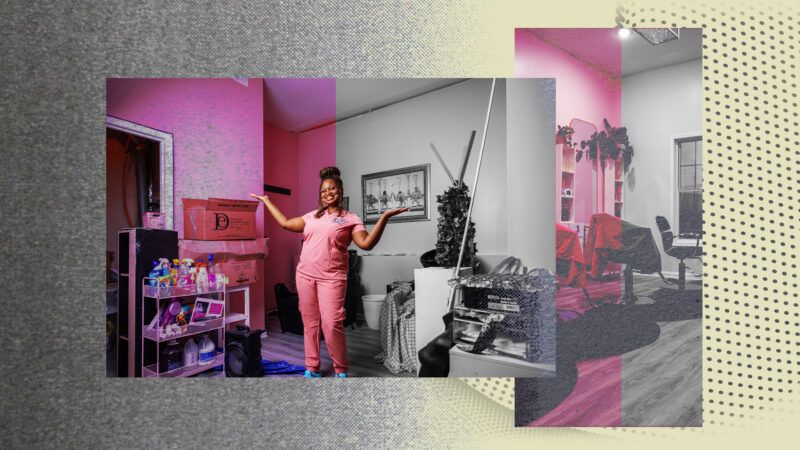Georgia Woman Could Lose $30,000 After Local Government Denies Her Permit To Open Hair Salon
Despite meeting all the requirements, the Board of Commissioners in Clayton County made an arbitrary decision to deny Khalilah Few a conditional use permit to open her salon.

When Khalilah Few opened her salon, Creative Crowns Collective, in 2023, she didn't think her business savvy would put her at odds with the local government. But two years later, she now finds herself in a legal battle with Clayton County, Georgia.
After outgrowing her original studio space, Few signed a two-year lease for a new salon housed in an old barbershop in Jonesboro, a city in Clayton County, in March. She invested over $30,000 into the property and applied for a Conditional Use Permit (CUP) in April to open her salon. Despite meeting the legal requirements for a permit, the Clayton County Zoning Advisory Board and the Board of Commissioners denied Few's application in July.
Instead of the law, county officials cited a "saturation" of similar businesses in a 5-mile radius, arguing the salon would not "grow Clayton County smartly." Commissioner DeMont Davis, whose fourth district includes the new location of the salon, even noted that Few's plan "does align" with the county's economic development plan but still voted against it, saying Few's business was "just in the wrong area."
Few has filed a lawsuit against Clayton County, alleging violations of the Due Process and Equal Protection clauses of the Georgia Constitution. Jessica Bigbie, an attorney at the Institute for Justice (I.J.), which is representing Few, tells Reason that "nothing in the ordinance or the law says anything about smart growth being a basis to deny a permit."
Throughout the process, Few says county staff gave "vague" responses when asked about requirements and reasons for denial. She tells Reason the first time she heard about "oversaturation" was when she attended her meeting with the zoning advisory board. "What's frustrating and infuriating about this process is I asked questions, I directly asked, 'What are some reasons that this application can be denied?'" She says, she "wanted to be prepared."
Clayton County officials did not respond to Reason's request for comment.
Few's hurdles can be traced back to 2024, when Clayton County amended its municipal code and designated District 4, where the proposed salon is located, as a General Business Zoning District with a Business Corridor Overlay District. This overlay permits some businesses to open without a CUP while requiring one for others. Personal service establishments, such as dry cleaners or watch repair shops, typically do not require a CUP, whereas hair salons do.
The county's CUP criteria for District 4 appear arbitrary, as they treat similar businesses unevenly. Day cares and dance/music schools are permitted, but gyms and places of worship are conditional. Counterintuitively, even potentially hazardous companies, such as research labs, are permitted.
To get a CUP, applicants must meet with the Technical Review Committee, community residents, and the Zoning Advisory Group, then attend a final hearing before the County Board of Commissioners. The board considers the application's proper filing, the Zoning Advisory Group's recommendation, compliance with permit conditions, and consistency with the ordinance's purpose and intent. They also weigh the benefits against potential harm to properties or the county and can impose reasonable conditions to ensure public health, safety, and welfare.
Few's salon met the permit conditions, and she provided county staff and the commissioners with not only her application but a presentation detailing her alignment with the county's 2039 comprehensive development plan as well as Davis' stated economic priorities. She also had "over 50 letters of support," yet none of that mattered. "I think you have a fabulous business," said Davis. "You have a fabulous personality, and I love what you bring, and you actually hurt my heart right now, but we've got to deny," he added.
"The Board of Commissioners concedes that the salon fits the plan; it's a good business, she's doing the right thing, she is just not doing it where they want her to do it," says Bigbie. "The government shouldn't be stopping legitimate businesses from opening to stop them from competing with others."
Clayton County officials have denied several other potential salon owners a CUP since the passage of the 2024 ordinance. Lea Bakam, who owned LeNa Braiding, tells Reason she was denied a CUP on June 17 after spending "more than $35,000" fixing up a salon in Clayton County. Like Few, Bakam presented the board of commissioners with her business plan and letters of support. Yet, in denying the permit, Davis again noted that the area was "extremely saturated with salons."
The Georgia Supreme Court has already ruled, in Raffesnber v. Jackson (2023), that it is a violation of due process rights when governments restrict the pursuit of "lawful occupation of their choosing free from unreasonable government interference." I.J. prevailed in a similar case in Fulton County, Georgia—Diagne v. City of South Fulton (2024)—in which the Fulton County Superior Court struck down the town's attempt to block Awa Diagne from opening a salon. The court found that the county's denial of a permit ran "contrary to Georgia's long history of constitutional jurisprudence."
Few has filed for an interlocutory injunction to continue working while her court case is pending. Clayton County must respond to her lawsuit by September 18.
